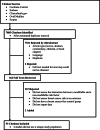Modifiable risk factors in women at high risk of breast cancer: a systematic review
- PMID: 37095519
- PMCID: PMC10123992
- DOI: 10.1186/s13058-023-01636-1
Modifiable risk factors in women at high risk of breast cancer: a systematic review
Abstract
Background: Modifiable risk factors (alcohol, smoking, obesity, hormone use, and physical activity) affect a woman's breast cancer (BC) risk. Whether these factors affect BC risk in women with inherited risk (family history, BRCA1/2 mutations, or familial cancer syndrome) remains unclear.
Methods: This review included studies on modifiable risk factors for BC in women with inherited risk. Pre-determined eligibility criteria were used and relevant data were extracted.
Results: The literature search resulted in 93 eligible studies. For women with family history, most studies indicated that modifiable risk factors had no association with BC and some indicated decreased (physical activity) or increased risk (hormonal contraception (HC)/menopausal hormone therapy (MHT), smoking, alcohol). For women with BRCA mutations, most studies reported no association between modifiable risk factors and BC; however, some observed increased (smoking, MHT/HC, body mass index (BMI)/weight) and decreased risk (alcohol, smoking, MHT/HC, BMI/weight, physical activity). However, measurements varied widely among studies, sample sizes were often small, and a limited number of studies existed.
Conclusions: An increasing number of women will recognize their underlying inherited BC risk and seek to modify that risk. Due to heterogeneity and limited power of existing studies, further studies are needed to better understand how modifiable risk factors influence BC risk in women with inherited risk.
© 2023. The Author(s).
Conflict of interest statement
The authors declare that they have no competing interests.
Figures



References
-
- Office of the Associate Director for Science (OADS): Genomics & Precision Health. Knowing is not enough—act on your family health history. Centers for Disease Control and Prevention. 2020. Available from: https://www.cdc.gov/genomics/famhistory/knowing_not_enough.htm
-
- Regalado, Antonio. 2017 was the year consumer DNA testing blew up: More people took genetic ancestry tests last year than in all previous years combined. MIT Technol Rev: Biotechnol. 2018. technologyreview.com/2018/02/12/145676/2017-was-the-year-consumer-dna-te.... Accessed 25 Aug 2019.
Publication types
MeSH terms
Substances
Grants and funding
LinkOut - more resources
Full Text Sources
Medical
Miscellaneous

